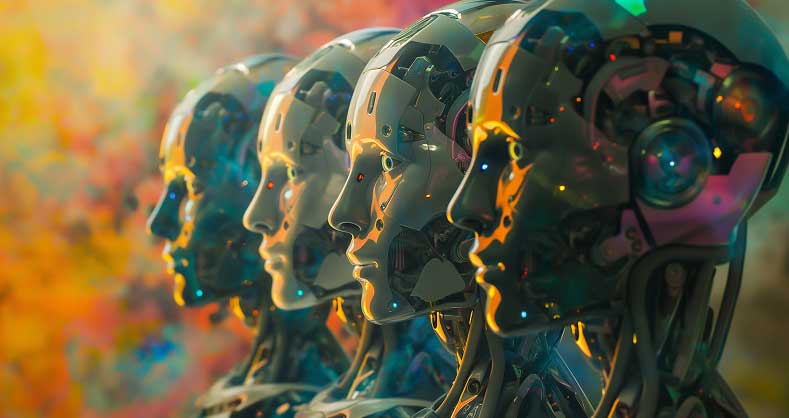Multimodal AI: The Next Frontier in Generative AI
Autonomous AI Agents: The Future of Generative AI
Generative AI has revolutionized content creation, decision-making, and data analysis. Now, the field is evolving toward autonomous AI agents—intelligent systems capable of acting independently to achieve predefined goals. These agents represent the future of generative AI, where machines move from being passive tools to proactive collaborators, transforming industries and workflows.
What Are Autonomous AI Agents?
Autonomous AI agents are systems designed to independently perform tasks, adapt to changing environments, and make decisions without constant human input. Unlike traditional AI systems that rely heavily on user guidance, these agents combine generative AI models with decision-making frameworks to operate autonomously. For instance, a marketing AI agent can analyze trends, create promotional content, and schedule campaigns without human intervention, saving time and resources.
Key Components of Autonomous AI Agents
1. Generative AI Models: Core models like GPT-4 and DALL-E power these agents, enabling them to generate text, images, or other media dynamically.
2. Decision-Making Mechanisms: Reinforcement learning allows agents to make optimal decisions through trial-and-error methods, improving over time.
3. Contextual Understanding: By integrating natural language processing (NLP) and multi-modal AI, agents can process and respond to text, images, or sensor data in real time.
4. Memory and Learning: Persistent memory modules enable agents to retain context across tasks, allowing personalized and continuous interactions.
5. Integration Capabilities: Agents connect with APIs, IoT devices, and databases to automate workflows, control systems, or fetch and analyze data.

Real-World Applications
1. Customer Support: Companies deploy AI agents to handle complex queries, provide personalized assistance, and suggest products. Unlike static chatbots, these agents adapt dynamically to user needs.
- Example: An e-commerce platform using an autonomous agent to resolve complaints, track deliveries, and recommend relevant products.
2. Healthcare:Autonomous agents monitor patient vitals, suggest interventions, and streamline administrative tasks like scheduling.
- Example: An AI agent analyzing patient data to flag anomalies and recommend early interventions, reducing healthcare provider workloads.
3. Finance: AI agents perform fraud detection, portfolio management, and automated trading with real-time market analysis.
- Example: Autonomous systems predicting market trends and executing trades faster than human analysts.
4. Creative Industries: Generative AI agents assist in designing visuals, composing music, and writing scripts.
- Example: An agent producing a complete advertising campaign, from brainstorming ideas to generating content.
5. Autonomous Robotics: These agents optimize navigation, object recognition, and task execution in robotics applications, from autonomous vehicles to manufacturing
Challenges and Responsible AI Integration
1. Ethical Concerns:Generative AI agents assist in designing visuals, composing music, and writing scripts.
- Bias and Fairness: Autonomous agents must be trained on diverse datasets to avoid perpetuating societal biases.
- Decision Accountability: Clear frameworks are needed to determine who is responsible for the actions of autonomous agents.
2. Interpretability:Explainable AI (XAI) techniques are essential for understanding and validating agent decisions, especially in critical fields like finance and healthcare.
- Example: Using SHAP to analyze why an AI agent flagged a specific financial transaction as fraudulent
3. Data Privacy and Security Autonomous agents must comply with regulations like GDPR while safeguarding sensitive data.
4. Energy Efficiency: Large generative models are resource-intensive, raising sustainability concerns. Optimizing these systems for efficiency is critical.
5. Integration with Legacy Systems: Adapting agents to work seamlessly with existing infrastructure requires significant technical effort.
The Road Ahead: Opportunities and Trends
1. Collaborative Agents: Future systems will work alongside humans and other agents, solving complex problems in distributed networks.
2. Personalized AI Assistants: Agents tailored to individual user preferences will provide highly personalized recommendations, reminders, and proactive solutions.
3. Edge Computing: Deploying agents on edge devices will reduce latency, improve real-time decision-making, and enhance privacy by minimizing data transmission.
4. Generalist Agents: Advances in generative models will enable agents capable of handling multiple tasks across domains, reducing the need for domain-specific customization.
5. Responsible AI Frameworks: Industry-wide adoption of Responsible AI principles will ensure ethical, transparent, and fair deployments. Collaborative efforts between governments, academia, and private sectors will establish robust guidelines.
Autonomous AI agents are set to redefine the future of generative AI, transitioning machines from passive tools to active, decision-making collaborators. By integrating Explainable AI and Responsible AI principles, industries can build systems that are not only efficient and innovative but also ethical and transparent. As these agents continue to evolve, they promise to unlock unprecedented possibilities across every sector, heralding a future where AI seamlessly collaborates with humans.